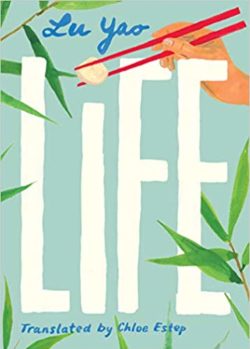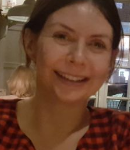Life, by Lu Yao
translated by Chloe Estep
Amazon Crossing, 2019
Publisher's blurb
An essential masterwork from Chinese literary giant Lu Yao — winner of the Mao Dun Literature Prize —available for the first time in English.
Lu Yao published only two novels before his untimely death—but their extraordinary influence catapulted the author to the top tier of Chinese contemporary fiction, establishing him as one of the most widely read and respected figures in Chinese literature.
In this first-ever translation of Lu Yao’s Life, we meet Gao Jialin, a stubborn, idealistic, and ambitious young man from a small country village whose life is upended when corrupt local politics cost him his beloved job as a schoolteacher, prompting him to reject rural life and try to make it in the big city. Against the vivid, gritty backdrop of 1980s China, Lu Yao traces the proud and passionate Gao Jialin’s difficult path to professional, romantic, and personal fulfillment—or at least hard-won acceptance.
With the emotional acuity and narrative mastery that secured his reputation as one of China’s great novelists, Lu Yao paints a vivid, emotional, and unsparing portrait of contemporary Chinese life, seen through the eyes of a working-class man who refuses to be broken.
Reading Chinese Network Reviews
Reviewed by Lorna Amor, 6/2/20
 A lot happens in a short space of time in Lu Yao’s early 1980s classic, Life. It’s a rollercoaster of a ride for our protagonist, Gao Jialin, as he navigates his way through those uncertain years after high school graduation, making a name and carving out a life for himself in a small world strewn with romantic, social and political obstacles.
A lot happens in a short space of time in Lu Yao’s early 1980s classic, Life. It’s a rollercoaster of a ride for our protagonist, Gao Jialin, as he navigates his way through those uncertain years after high school graduation, making a name and carving out a life for himself in a small world strewn with romantic, social and political obstacles.
The only child of uneducated peasants, Jialin is talented and displays post-revolutionary ideals of what a young man should be: attractively masculine, intellectual but not afraid of physical labour, loyal to his family and community yet open to and interested in the wider world. Despite this good fortune in the natural talent department, part one opens with him losing his job as community teacher to the son of a village elder, who has outranked Jialin and pulled strings to oversee the job transfer. Following a simple story arc from here, we see Jialin apparently destined to abandon his dreams of a career and work as a field labourer, falling in love with the illiterate, charming Qiaozhen and bumpily settling for the quiet life his parents have enjoyed before him. His romance with Qiaozhen involves clandestine rendezvous arranged in fields; boiled eggs are consumed and folk songs are recited. Yet despite their innocence, they break taboos by kissing in private, stepping out in public and ignoring old-fashioned etiquette while attempting to pursue their own happiness. Various guanxi are put to use to remove Jialin from this tryst and save Qiaozhen’s reputation, and we are given a sense of the complexities of party politics and familial and village relationships. Off to the city Jialin goes as a celebrated journalist, and we enter part two on a wind of change.
The languid scenes and easy chatter of the countryside are replaced by a catalogue of Jianlin’s professional progress as a model worker and more dense internal dialogue. Back into his life struts high school classmate, Huang Yuping, with her Shanghai style, bourgeois ideas and the extra complication of a long-term boyfriend. Forks in the road begin to appear.
There are no sudden plot twists to take your breath away, the episodic nature of the plot means that the storyline is spelled out, but Lu’s (and translator, Chloe Estep’s) masterly use of language paints a crystal clear picture of Jialin’s life and concisely illustrates his choices between old-fashioned or progressive ways, country life or city life, being corrupt or being honest, following his heart or following his prospects and so on. Jialin faces decisions at every turn, and his choices can be seen to symbolise those of the countless other peasants trying to leave rural lives for a new and unknown urban future. The author seems to offer options for readers to weigh up and judge for themselves what is right and what is wrong. Lu himself appears to err on the side of progress, whilst favouring the simplicity of good, honest, hardworking folk who know their place in the grand scheme of society and his country.
The story is fondly told with an almost tangible backdrop of the Great Horse River Valley; farmed yellow earth mountainsides, archaic cave houses, the flow of the river and the road that follows its banks in and out of the mountain city with its bright lights shining on promises of equally bright futures. Lu’s descriptions are those of a man who knows and loves this land. Borrowing heavily from local nature, his readers are treated to vivid, poetic imagery. Vistas of fresh valleys and picturesque cities nestled between mountains are spread out as the stage on which Jialin acts out his life.
Throughout the book we move in Jialin’s circles, absorb the attitudes his acquaintances have of him, and live his struggles with him, with the result that I was left feeling fond of this dramatic, confused, well-meaning young man, his tightknit band of villagers and the few city dwellers he calls friends. By the end of the book, despite his regretful turns and the author’s occasional didactic tone, I found myself rooting for Jialin, my fingers crossed that from here on in he can take heed of his narrator’s fatherly words and learn to tread a kind, sensible path into adulthood.
‘Contemporary’ doesn’t feel like quite the right descriptor for this novel, although Life is undoubtedly an 80s classic in China. Alongside Wu Tianming’s 1984 film adaptation of the book, the novel sits comfortably on the modern culture shelf. But this picture of life and society in China in the 1980s is far removed from that of today, and though Estep’s smooth translation breathes fresh life into the text well, reading this here and now, the cultural content can come across as outdated. I couldn’t help wondering (as I waded through Party titles and jargon, and guffawed out loud at questionable attitudes towards personal hygiene and women) whether the novel allows a current western audience to give Lu Yao his due respect for both the progressiveness and openness within these pages and his lyrical use of language. Estep’s translation shines a light on a well-crafted example of 80s Chinese literature, as well as on a very distinct period of change within China, and with that in mind, Life is enough of a page-turner to warrant a read.
Reviewed by Lorna Amor
Reviewed by Zahra Raja, 1/1/20
 Life follows the trials and tribulations of Gao Jialin, a peasant schoolteacher who finds himself ousted from his job due to local nepotism and subsequently is offered a better position in the city by corrupt means. The novel is set against the backdrop of the 1980s, a particularly turbulent time in China’s history which saw the country open up to the outside world and undergo economic reform. The impact of these reforms made it possible for rural peasants such as Jialin to escape poverty and the countryside, however this is not a positive, transformative journey; rather he ends up returning to his home village in shame, losing everything because of the corruption that led to his new job appointment in the first place. When Jialin abandoned his rural roots for the urban environment it seems that his character and morals are somehow compromised which is one of the central themes to this novel; is urbanisation possible without the loss of moral principles, or is it inevitable that it will swallow traditional culture whole?
Life follows the trials and tribulations of Gao Jialin, a peasant schoolteacher who finds himself ousted from his job due to local nepotism and subsequently is offered a better position in the city by corrupt means. The novel is set against the backdrop of the 1980s, a particularly turbulent time in China’s history which saw the country open up to the outside world and undergo economic reform. The impact of these reforms made it possible for rural peasants such as Jialin to escape poverty and the countryside, however this is not a positive, transformative journey; rather he ends up returning to his home village in shame, losing everything because of the corruption that led to his new job appointment in the first place. When Jialin abandoned his rural roots for the urban environment it seems that his character and morals are somehow compromised which is one of the central themes to this novel; is urbanisation possible without the loss of moral principles, or is it inevitable that it will swallow traditional culture whole?
Jialin embodies the struggles that Chinese peasants faced in this period; we see the bitterness of the manual labour he is forced to undertake to try make up for the loss of his schoolteacher income and his own grief and regret at the unfairness of the system that has seen him lose his job to a far less competent candidate who is related to a politically powerful member of the village. However, despite an initial period of grieving at home, he throws himself wholeheartedly into manual labour to the point where other villagers have to beg him to stop; the bleeding and exertions of a body unused to hard labour is too much to bear. This is important to note because it shows that Jialin has not abandoned his rural roots despite his pursuit of a career in a classroom and still identifies with the countryside and with peasant life. He also strikes up a relationship with Qiaozhen – the local village belle who though illiterate, is kind-hearted and embodies all the traits deemed ideal for a woman to have; loyal, gentle, docile and of course, beautiful. Jialin is suffering righteously, but Qiaozhen provides an antidote. Because of her, “even though he had endured suffering, his life was still rich with affection.” (243)
However, this all changes when he is offered a position in the city due to the corrupt village forces seeking to further their own agendas. Jialin leaves Qiaozhen behind in the village which marks the end of Part 1 of the novel and ushers in his new life in the city in Part 2. The Jialins from both parts are as different as day and night – his move to the city transforms him and changes his ambitions and outlook on life entirely. He becomes dazzled by city life and starts to lose sight of his roots despite warnings from the villagers who come to visit him, and his ambitions start to overtake him. He meets Huang Yaping, a girl from a wealthy background who offers him everything he could ever want in terms of wealth and career opportunities. Jialin sums up the difference between his relationship with Yaping and Qiaozhen succinctly: “as a lover, Yaping was an ideal choice. Even though he had never loved Yaping like he had loved Qiaozhen, he felt their love would be better, richer, more dazzling!” (244) Jialin is fully conscious that pure, loving Qiaozhen is the better choice but he chooses his own ambitions instead.
Jialin therefore discards the distraught Qiaozhen and in doing so makes a conscious decision to cast aside his country roots with disastrous consequences. He loses his position in the city when it is discovered he gained it by corrupt means and trudges back to his village only to discover that Qiaozhen has married another to save face. Jialin’s struggles throughout the novel seem to embody the dangers of a country that is modernising too quickly, and captures the fear at the time that mass movement to the cities meant the casting off of traditional rural roots and ways of life. It seems that in the novel that the urban is unable to reconcile with the rural and it is inevitable that a move to the city means a loss of identity, and Lu’s didactic tone reinforces this.
It was a straightforward read made accessible by Chloe Estep’s brilliant translation, but brings nothing new to the table for those familiar with 20th century Chinese literature with the recurring themes of urbanisation, poverty, class struggle and corruption. A good place to start for those new to Chinese literature.
Reviewed by Zahra Raja
Reviewed by Amy Matthewson, 23/7/19
 In Lu Yao’s novel, Life, we are introduced to Gao Jialin and we are invited into his life journey as he navigates career ambitions, corrupt officials, familial responsibilities, and romantic love. Gao Jialin is the educated son of peasants; he is clever, handsome, and ambitious. The story begins after he loses his teaching position in the village and for the entirety of the book, Lu Yao highlights the importance of status and social connections. Nepotism made him lose his job but corruption granted him a position as a reporter, working in the city which provides the environment for personal and professional advancement.
In Lu Yao’s novel, Life, we are introduced to Gao Jialin and we are invited into his life journey as he navigates career ambitions, corrupt officials, familial responsibilities, and romantic love. Gao Jialin is the educated son of peasants; he is clever, handsome, and ambitious. The story begins after he loses his teaching position in the village and for the entirety of the book, Lu Yao highlights the importance of status and social connections. Nepotism made him lose his job but corruption granted him a position as a reporter, working in the city which provides the environment for personal and professional advancement.
The title of the book is aptly chosen as the novel touches upon issues in life that are universally relatable. Jialin is faced with challenges that are beyond his control but rather than focus on the ‘unfairness’ of life, the story underscores the decisions he chooses to make. How does one react to hurt ego and pride? How do we strive for success when our decisions may hurt others? Are we ultimately responsible for other people’s happiness?
While the book has a certain charm to it, I find myself rather indifferent towards it. Perhaps I am growing tired of the tedious clichés of measuring a person’s worth according to expected gendered stereotypes. Jialin is pleased with his relationship with Qiaozhen. Even though she is uneducated and illiterate, she is extremely attractive. He is proud that “the most beautiful girl from the Great Horse River … was walking at his side, docile as a lamb” (137). Qiaozhen, on the other hand, loved Jialin because he is “a clever, strong, handsome gentleman” (137).
In the city, Jialin starts a relationship with an old classmate, Yaping, who is the intellectual opposite of Qiaozhen. Yaping is smart, educated, and does not defer to Jialin on anything. My hopes that she would break the clichés were dashed to pieces when she complains to Jialin about the kindness of Ke’nan, her soon-to-be-ex. Ke’nan “couldn’t get angry if you stabbed him in the neck with a knife!” Yaping prefers Jialin’s bad temper, telling him he is “a pillar of manhood and integrity, with real vigor coursing through [his] veins” (246).
For some, these stereotypes may only be a minor distraction from the larger themes of the book and Life does indeed have a lot to offer in terms of presenting universal problems. However, I was simply not ‘wowed’ by it although Chloe Estep has done a wonderful job in translating the book.
For lack of a better expression, my overall impression was a ‘meh.’
Reviewed by Amy Matthewson
Reviewed by Catherine Shipley, 22/7/19
 On learning that Life was written in 1982, yet remains one of China’s bestselling novels, I was eager to start reading. It was of interest to me that, despite being so popular in China, this translation by Chloe Estep is the first English translation of Life. For a novel that has moved Chinese people for over thirty years to have only just been made accessible to an international audience seems incredible.
On learning that Life was written in 1982, yet remains one of China’s bestselling novels, I was eager to start reading. It was of interest to me that, despite being so popular in China, this translation by Chloe Estep is the first English translation of Life. For a novel that has moved Chinese people for over thirty years to have only just been made accessible to an international audience seems incredible.
What is the secret of its success and why is it so relevant today? Lu Yao’s storytelling appears to be fairly simple and straightforward, without frilly embellishments. Gao Jialin, the son of cave-dwelling peasants from a poor country village, has made it through high school and has failed to get into university. He does not, however, want to accept his fate as an impoverished farmer. He takes up a teaching job, which elevates him to a much better position in rural society and then loses it to corruption. He is determined to make it to the city to reach his full potential. Similar struggles to make it from a rural to an urban setting will have faced a huge number of Chinese people over the years, from the reforms of 1978 that led to huge urban population growth, to more recent moves of migrant workers temporarily living in cities to improve their circumstances and to continued urbanisation today.
Life is an apparently simple recounting of a sequence of events experienced by the protagonist, Jialin but, just as life itself cannot be reduced to a series of occurrences, the story is far more nuanced and controversial than it may seem. Above all, it makes the reader question the social impact of urbanisation. Once Jialin makes it to the city, working in a prestigious role, his ‘countryside’ traits, such as sincerity and loyalty, start to flounder. It seems it may be necessary to sacrifice such attributes in order to enjoy the richness of city life.
After some initial hesitation, Jialin eventually doesn’t really look back. He doesn’t visit his family and, when his father and family friend Deshun, come to him, attempting to remind him of his values, they are quickly dismissed. He gives up his illiterate rural sweetheart, with whom he once shared a pure, romantic love. His new girlfriend, Huang Yaping, is far more exciting and better educated. Not only does she dress him in the latest fashions but she is also able to offer him a chance to go to Nanjing, an unfathomably large city, to realise his ambitions. It is clear that the rural and urban worlds cannot mix; it is impossible to thrive in one whilst deeply rooted in the other.
Having shaken off his peasant background, Jialin is attractive, successful and admired by his fellow city-dwellers. Until things go wrong. On encountering a huge setback his high-flying existence starts to crumble around him. It is then that we start to question how reliable the cities blessings are. Are Jialin’s true relationships those in the city, developed from a mix of passion and strategic advantage, or those in the country, formed with powerless peasants?
Life arguably shows nostalgia for a long-lost China, the pre-capitalist China. Although life was tough, by and large people were community-minded. People supported each other and directly saw how their behaviour could impact on others. This is shown through the depiction of life in the village commune, contrary to that in the town. The selfishness of city dwelling can be shown by, for example, Huang Yaping’s sudden casting aside of her almost-fiancé in favour of the no-longer-a-peasant Gao Jialin. Contrarily, an example of the selflessness of rural dwellers is shown by the bachelor Deshun; each time his peach tree bears fruit, he distributes it amongst all the children in the village.
The arrogance of city dwellers, hinted at in Life is still relevant today; we can see the sense of superiority with which many city dwellers treat the migrants that build their cities and serve their needs. A very memorable scene shows Jialin entering the city where he studied as a high school student. He is there to collect nightsoil for the village. He is covered in human excrement from head to toe, at which point he encounters an old classmates’ mother. Although he ate at her house once, she doesn’t recognise him at all. Immediately she deems him to be a worthless, dirty peasant and hurls abuse at him. She barely sees him as human. Yet the way in which Jialin later embraces his new identity as a city-dweller makes us question how exactly he experienced this incident. Rather than demanding for peasants to be treated with equal respect, he follows the assumed irreconcilable divide, he is happy and relieved to have made it and no longer needs to concern himself with the wellbeing of rural dwellers.
Life is a story that offers much for readers to mull over and to relate to, from the relationships between parents and children, the way in which economics and culture can restrict people from reaching their potential, what constitutes a good relationship, the impact of status and of corruption, inequality (including that between women and men) and much more. All these factors have created a book that leaves a lasting impression on both Chinese and international readers.
Reviewed by Catherine Shipley
Reviewed by Markéta Glanzová, 21/7/19
 The novel Life (1982) by one of the most widely read Chinese authors, Lu Yao, waited almost forty years to be translated into English and introduced to an English readership. The novel was translated by Chloe Estep who made it a fluent and enjoyable read. Life takes place at the beginning of 1980s and is divided into two parts, the first part is set into Chinese countryside, and the second part depicts the life in a modern city. The whole novel is based on the contradictions between these two different worlds which represent the tradition and the modernity and capture the changing climate of the 1980s China.
The novel Life (1982) by one of the most widely read Chinese authors, Lu Yao, waited almost forty years to be translated into English and introduced to an English readership. The novel was translated by Chloe Estep who made it a fluent and enjoyable read. Life takes place at the beginning of 1980s and is divided into two parts, the first part is set into Chinese countryside, and the second part depicts the life in a modern city. The whole novel is based on the contradictions between these two different worlds which represent the tradition and the modernity and capture the changing climate of the 1980s China.
The main protagonist of the story is a young bachelor Gao Jialin who obtained a high school education and became a teacher in the village. He is a strong-willed and ambitious character, however, because of nepotism he loses his job at school and is forced to become peasant like his parents. Even though he has very strong ties to the land and his village, the village soon becomes too small for him and when he gets a chance to get a position in a big city, he doesn't hesitate and takes it. In Jialin's life, there are two important women – Liu Qiaozhen who lives in the same village and never obtained any education but is very kind, honest and loves Jialin with all her heart, while on the other side stands an educated, modern city girl, Huang Yaping. As I said before, the novel is based on contradictions, and the two girls in my opinion as well represent the clashing worlds of traditional and modern China. The love triangle then symbolizes Jialin who is captured in between the two different worlds.
The novel Life has a simple, well-structured plot which is easy to follow. However, what charms the reader the most is the lyrical style in which the story is written. Lu Yao is very sensitive to nature and its changes and can precisely capture the atmosphere of changing seasons and countryside. The novel is a celebration of the motherland, hard work, and a simple lifestyle. The characters feel a strong connection to their land and even though life at the countryside is hard, the countryside is described as a place where the hard work is always rewarded. The city is, on the one hand, captured as a place of opportunity, but on the other hand its environment is wild and it is hard to survive there. The city can be both charming and dangerous, but one can never know which side of it the city will reveal. It is exactly this dichotomy between the village and the city, old and new, traditional and modern, on which the novel is built and which makes it an interesting read.
Life tells a story which can be read from two different perspectives. Firstly, as a story about changing and modernizing China and the challenges the Chinese had to face in the 1980s, or secondly, as a universal story about the human desire to succeed in a changing society and the moral dilemmas one must face on one's journey. Either way, the novel Life, which combines its heavy topics with a soothing lyrical tone, is a book worthy of your attention.
Reviewed by Markéta Glanzová
Reviewed by Kevin McGeary, 1/7/19
 During his tragically short life, Lu Yao became a literary sensation due to his novels that captured the zeitgeist of a rapidly urbanizing China. In a country used to vague and verbose writing (often in the form of political propaganda), Lu’s stripped-down and lyrical prose made him nationally popular by his mid-30s.
During his tragically short life, Lu Yao became a literary sensation due to his novels that captured the zeitgeist of a rapidly urbanizing China. In a country used to vague and verbose writing (often in the form of political propaganda), Lu’s stripped-down and lyrical prose made him nationally popular by his mid-30s.
The characters in his award-winning debut novella Life published in 1982, just six years after the end of The Cultural Revolution, represented different facets of the new China. This dark and fatalistic story captured the struggles and aspirations of a nation whose people were now encouraged to ‘jump into the sea’ of entrepreneurship.
The plot centres on Gao Jialin who, due to political manoeuvring above his station, loses his job in education and is forced to become a labourer, rendering him unable to apply all his hard-won bookish knowledge. Under a government that has recently ceased to crush its people’s entrepreneurial genius, the aspirational Gao manages to escape to the city and a higher status in society.
He is subsequently torn between two women. There is the sweet unintellectual provincial Liu Qiaozhen, whose beauty and devotion captivate Gao in early life. And there is the elegant and well-spoken Huang Yaping, who has committed to marry another man.
Gao’s ambition causes him to drift apart from Qiaozhen. In one scene, though they are still in love, they are stuck for something to talk about. Gao laments that ‘she couldn’t name fourteen kinds of new or renewable energy’, she looks pitiful, ‘wanting him to want her but not knowing how to make it so.’
To break things off with Qiaozhen, Gao wants to write her a letter, but he has no choice but to tell her to her face because she is illiterate. The story is told through shifting viewpoints, allowing the reader to enter the thoughts of all characters. Lu Yao fully understood that the inner lives of uneducated people were as deep and complex as those of the more bookish. Her environment has not given Qiaozhen an adequate vocabulary, but she is wise and bright and as conscious of the real facts as anybody else.
In “Age of Ambition”, New Yorker correspondent Evan Osnos pointed out that in the 1970s it was valued for a Chinese man to be laoshi (老实), meaning earnest and stoic. However, in the new China, young men were urged to be fengliu (风流), adventurous and spontaneous. It his new adventurousness that proves Gao Jialin’s undoing.
Huang Yaping’s father is appalled at her decision to leave her fiancé for Gao Jialin, claiming that the younger generation is undoing all the good work of the revolution. In the new China, the material success that Gao accomplishes through his adventurousness does not provide him with the happiness he craves: ‘While people may feel happy with their accomplishments, they may also feel a sense of loss at the suddenness of their success.’
Translator Chloe Estep does a brilliant job of rendering Lu’s deceptively simple prose into English. My copy is full of post-it notes to mark passages of excellent prose that I hope to memorize.
Gao Jialin’s story is a compelling example of how a generation left home to acquire wealth and possessions, but forgot that – like the earthworm – humans are creatures of the soil. His detachment from the land ends up damaging the most important relationships in his life.
Reviewed by Kevin McGeary
Reviewed by Andy Thomas, 29/6/19
 The author Lu Yao changed his name from his birth name, Wang Weiguo, 王卫国, a typical name from the birth of the People’s Republic, prior to publishing this book in the earlier years of the modern reform period, and so an account of that change echoes through this outstanding novel.
The author Lu Yao changed his name from his birth name, Wang Weiguo, 王卫国, a typical name from the birth of the People’s Republic, prior to publishing this book in the earlier years of the modern reform period, and so an account of that change echoes through this outstanding novel.
Often this is obvious, for example when the village Secretary laments the hint of “individualism” and the creation of two competing “production responsibility groups” from a single commune “production brigade”, but more subtly, when a Soviet song about the Dnepr River is an early recollection, and a Russian oil painting of a girl in a red scarf in hero Gao Jialan’s head - a Repin? - becomes just a foreign painting by the end of the novel.
Gao Jialan is the male hero who lives in the village Gaojia, but he is nothing without two women with whom he is in love, one a country peasant and the other a rising urban professional. In a classic love story, he is torn between the two, cannot choose, and loses both. Unsaid, his society is torn by the division between the rural peasantry and the urban dwellers; also unsaid is the question: is this a classless society?
In these divided circumstances Gao’s economic position is as capricious as the weather on the festival and lunar days still known from tradition.
But by bouncing back from his role as an educated teacher to hard manual labour on the land, Gao Jialan demonstrates an important Maoist virtue: the ability to bear hardship. And in a sensitive and experienced account, Lu Yao describes how Gao’s first love is all the greater for his having been one of “those who have entirely lost faith in themselves.”
It is a strength of this novel, and its translation, that Chinese songs and sayings, revolutionary or traditional, are ever present in the dialogue. So “Walking Through the Western Pass” and “Keep the Red Flag Flying” are as present as the poems of Bai Juyi, as are children’s mocking songs, and ancient rhymes and village sayings.
The technology of the time is left unexplained – a fountain pen, developing and printing photographs, a “flashbulb”, and spinning reels (of tape recording), and indeed, a radio station.
Chloe Estep’s translation gives easy reading, and is to be commended overall, although occasionally it lapses into casual if not teenage American English. Apart from the ubiquitous “gotten” she writes of an “army buddy”, “movies” and a “comforter”, whatever that may be. I prefer spelling “naïve” with the diphthong, and certainly “naïvité” with the diphthong and the accent. “Teared up” could have been better replaced by “cried”, as Gowers might have advised, and so on. And an “Ass” is a mule, as in the last Commandment of the Decalogue, and so in an agricultural novel the phrase given “he wouldn’t know his ass from his elbow” in American English gains something unwanted. But these are minor errors in a long novel, and her defiant preservation of the Chinese name is exemplary.
Reviewed by Andy Thomas
Reviewed by Michelle Deeter, 23/6/19
 Life by Lu Yao follows the rise and fall of Gao Jialin, a confident young man who has a chance to move to the city and follow his dreams but ultimately is punished for his excessive ambition. Gao Jialin is unfairly dismissed from his teaching job as a result of blatant nepotism, but his parents beg him to turn the other cheek and avoid causing trouble in their small village. He dutifully joins his parents in tilling the land and he falls in love with a beautiful country girl, Liu Qiaozhen. She is illiterate but steadfastly loyal. Despite their budding relationship, Jialin jumps at the chance to work as a reporter in the county seat, where he can make a name for himself. Then an old friend, Huang Yaping, who is engaged to a reliable but boring young man, visits Jialin and reminds him of all the times they had stimulating conversations in high school. She actively pursues Jialin, forcing him to make a choice: end his courtship with sweet Qiaozhen and marry a mercurial but fascinating city woman, or ignore the enticing possibility to start a new life and return to the countryside for a humble but happy life. Now that he has gotten a taste for the city life, Jialin starts to think that his passion for Qiaozhen has waned.
Life by Lu Yao follows the rise and fall of Gao Jialin, a confident young man who has a chance to move to the city and follow his dreams but ultimately is punished for his excessive ambition. Gao Jialin is unfairly dismissed from his teaching job as a result of blatant nepotism, but his parents beg him to turn the other cheek and avoid causing trouble in their small village. He dutifully joins his parents in tilling the land and he falls in love with a beautiful country girl, Liu Qiaozhen. She is illiterate but steadfastly loyal. Despite their budding relationship, Jialin jumps at the chance to work as a reporter in the county seat, where he can make a name for himself. Then an old friend, Huang Yaping, who is engaged to a reliable but boring young man, visits Jialin and reminds him of all the times they had stimulating conversations in high school. She actively pursues Jialin, forcing him to make a choice: end his courtship with sweet Qiaozhen and marry a mercurial but fascinating city woman, or ignore the enticing possibility to start a new life and return to the countryside for a humble but happy life. Now that he has gotten a taste for the city life, Jialin starts to think that his passion for Qiaozhen has waned.
Jialin casts Qiaozhen aside. She accepts his explanation of the situation and wishes him well, becoming a perfect martyr. Yaping breaks off her engagement and completely ignores the shock and dismay of her parents and her fiancé. Just when it looks like Jialin is going to beat the odds and achieve all of his dreams, someone discovers that he got his job due to favoritism. He is fired from his position and has no choice but to move back to his hometown, disgraced. Huang Yaping, the scintillating city woman, is unwilling to move to the countryside with him; meanwhile Qiaozhen has already married another man to avoid criticism in the village. Jialin goes home feeling dejected and his wise uncle encourages him, saying, “You mustn’t lose hope! You also mustn’t look down on our little town.”
Old Deshun, Jialin’s uncle, gives sage advice throughout the story. He is clearly the vehicle for the author’s morals and values. Jialin is a compelling tragic hero, especially when he realizes that he is acting selfishly. Qiaozhen is too meek and accommodating, while many other female characters are stereotypical shrews. Female characters lacked agency, which disappointed me.
The translation by Chloe Estep was pitch perfect. The terminology was appropriate for the period, and I appreciated the use of pinyin for concepts like kang and xintianyou. I had to smile at sections on night soil — it was only in Chapter 12 that the word was explained in context. Some readers might be unaware of this agricultural practice, and the mention of human faeces might raise a few eyebrows. But the translation does not gloss over the disgusting aspects of living in the countryside and the book is better for showing both the romantic and the less appealing aspects of country life.
The book was interesting and I was delighted to learn about a time in China’s history that has vanished due to rapid modernization. I was frustrated by the fact that nobody thought Qiaozhen could learn to read as an adult. Why is it that only Jialin has an opportunity to grow and change? Still, it is inappropriate to judge a book from the past using the values of the present, and I think it would be unfair to judge the book too harshly. Life makes a valuable contribution to literature set in the Chinese countryside and proposes a number of interesting moral questions.
Reviewed by Michelle Deeter
